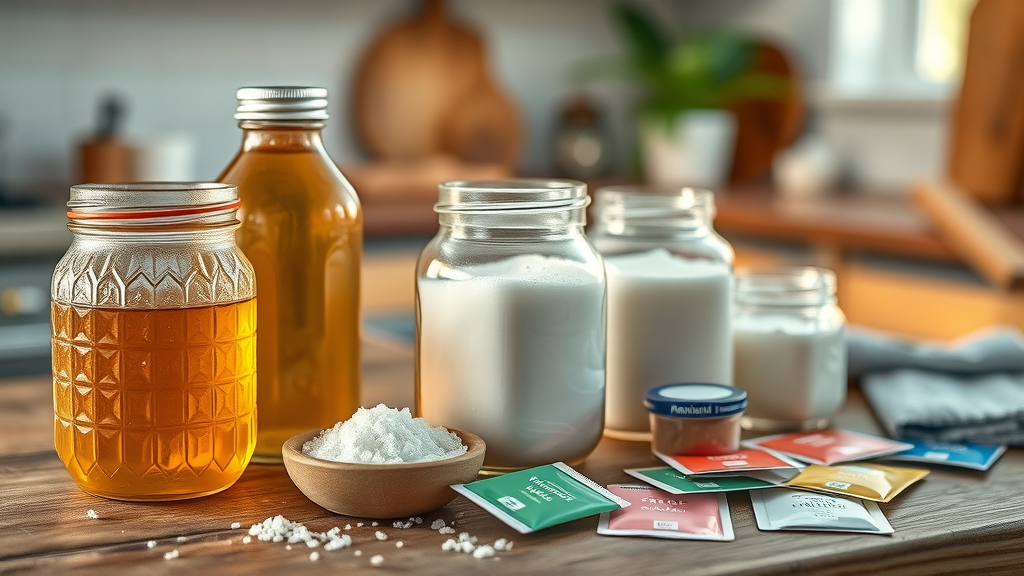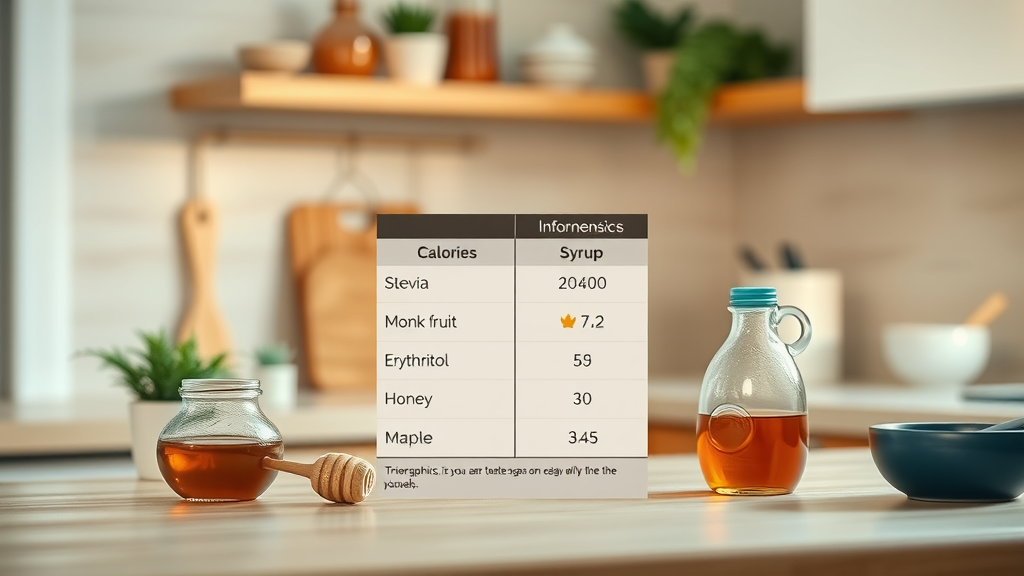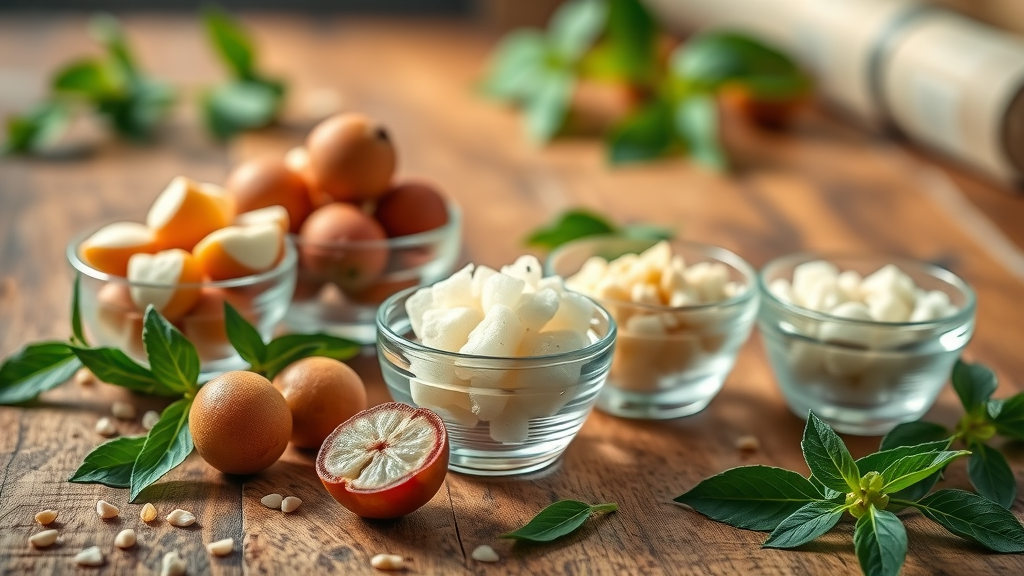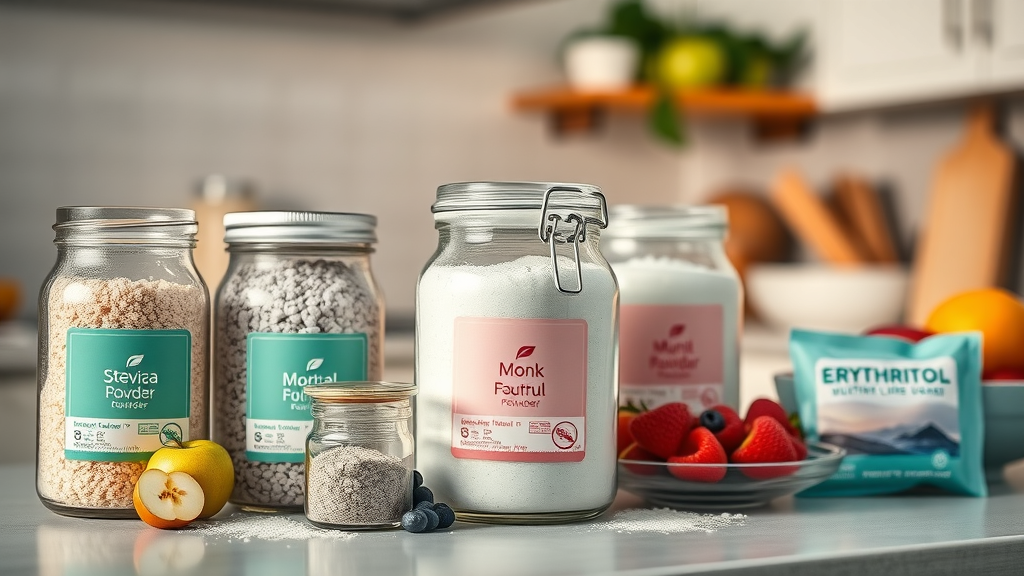Are you tired of the sugar crash that follows your sweet indulgences? You're not alone! As health-conscious choices become more vital, understanding sugar alternatives is key to transforming your diet and boosting your well-being. In "Transform Your Diet: Best Sugar Alternatives Revealed!", we’ll dive into the world of natural sweeteners and low-calorie options that can satisfy your cravings without the guilt. Discover how these alternatives can enhance your meals, support your health goals, and help you reclaim your energy. Let’s sweeten the deal!
Opening Hook: Understanding Sugar Alternatives
What You'll Learn About Sugar Alternatives
In this article, you will learn about various sugar alternatives available in the market, their health benefits, and how to incorporate them into your diet. We will explore natural sweeteners, artificial sweeteners, and sugar alcohols, providing you with a comprehensive understanding of each type. Additionally, we will discuss how to choose the right sugar alternative based on your dietary needs and preferences.
The Importance of Sugar Alternatives in Your Diet
Health Benefits of Reducing Sugar Intake
Reducing sugar intake is crucial for maintaining overall health. High sugar consumption is linked to various health issues, including obesity, type 2 diabetes, and heart disease. By opting for sugar alternatives, you can enjoy sweet flavors without the negative health impacts associated with excessive sugar. These alternatives often contain fewer calories and can help stabilize blood sugar levels, making them a smart choice for those looking to manage their weight and improve their health.
How Sugar Alternatives Can Help You
Sugar alternatives can be a game-changer for those looking to reduce sugar intake without sacrificing sweetness. They provide a way to enjoy your favorite foods and beverages while minimizing the risk of health complications. For instance, using monk fruit or stevia can help satisfy your sweet tooth while keeping your calorie count low. Moreover, many sugar alternatives have a lower glycemic index, which means they have a lesser impact on blood sugar levels, making them suitable for individuals with diabetes.
Top Sugar Alternatives to Consider
Natural Sweeteners: Honey, Maple Syrup, and Agave
Natural sweeteners like honey, maple syrup, and agave nectar are popular sugar alternatives that offer unique flavors and health benefits. Honey is rich in antioxidants and has antibacterial properties, while maple syrup contains essential minerals like manganese and zinc. Agave nectar, derived from the agave plant, is sweeter than sugar and has a lower glycemic index, making it a great option for those looking to reduce sugar spikes.
Artificial Sweeteners: Aspartame, Sucralose, and Saccharin
Artificial sweeteners such as aspartame, sucralose, and saccharin are widely used in many low-calorie and sugar-free products. These sweeteners are significantly sweeter than sugar, allowing for smaller amounts to be used. While they can help reduce calorie intake, some individuals may experience adverse effects, so it's essential to monitor your body's response when using these alternatives.
Sugar Alcohols: Erythritol and Xylitol
Sugar alcohols like erythritol and xylitol are another category of sugar alternatives. Erythritol, for example, has almost zero calories and does not raise blood sugar levels, making it an excellent choice for those with diabetes. Xylitol, on the other hand, is known for its dental benefits, as it can help reduce the risk of tooth decay. However, it's important to consume sugar alcohols in moderation, as they can cause digestive discomfort in some individuals.
Plant-Based Sweeteners: Stevia and Monk Fruit
Plant-based sweeteners like stevia and monk fruit are gaining popularity as natural sugar alternatives. Stevia, derived from the leaves of the stevia plant, is calorie-free and can be up to 300 times sweeter than sugar. Monk fruit, also known as luo han guo, is another natural sweetener that contains antioxidants and has no calories. Both options are excellent for those looking to reduce sugar intake while enjoying a sweet taste.
How to Choose the Right Sugar Alternative
Factors to Consider When Selecting Sugar Alternatives
When choosing a sugar alternative, consider factors such as taste, texture, and your specific dietary needs. Some sweeteners may have a distinct aftertaste, while others may not dissolve well in certain recipes. It's essential to experiment with different options to find the one that best suits your palate and cooking style.
Taste, Texture, and Cooking Applications
Different sugar alternatives can behave differently in cooking and baking. For instance, while honey and maple syrup can add moisture to baked goods, artificial sweeteners may not provide the same texture. Understanding how each sweetener interacts with other ingredients will help you achieve the desired results in your recipes.
Common Questions About Sugar Alternatives
What is the healthiest alternative to sugar?
The healthiest alternative to sugar often depends on individual dietary needs. Natural sweeteners like stevia and monk fruit are generally considered healthier options due to their low-calorie content and minimal impact on blood sugar levels.
What is the best substitute for regular sugar?
The best substitute for regular sugar varies based on personal preference and intended use. For baking, erythritol or monk fruit can be excellent choices, while honey or maple syrup may work better for sweetening beverages.
What is the perfect substitute for sugar?
The perfect substitute for sugar is subjective and can depend on the recipe and desired sweetness level. Experimenting with different sugar alternatives will help you find the one that works best for your taste and cooking style.
Why are people avoiding stevia?
Some people avoid stevia due to its distinct aftertaste or potential digestive issues. However, many enjoy its sweetness and health benefits, making it a popular choice among those looking to reduce sugar intake.
Key Takeaways on Sugar Alternatives
Summary of Benefits and Considerations
- Sugar alternatives can help reduce calorie intake and manage blood sugar levels.
- Natural sweeteners like honey and maple syrup offer unique flavors and health benefits.
- Artificial sweeteners provide a low-calorie option but may have adverse effects for some individuals.
- Sugar alcohols and plant-based sweeteners are excellent choices for those looking for healthier options.
- Choosing the right sugar alternative depends on taste, texture, and cooking applications.
Conclusion: Embrace Sugar Alternatives for a Healthier Lifestyle
Incorporating sugar alternatives into your diet can lead to significant health benefits, including weight management and improved blood sugar control. By understanding the various options available, you can make informed choices that align with your health goals. Embrace these alternatives and enjoy the sweet side of life without the guilt!
Call to Action: Start Your Journey with Sugar Alternatives Today!
Ready to transform your diet? Start exploring the world of sugar alternatives today! Whether you choose natural sweeteners, artificial options, or sugar alcohols, there’s a perfect fit for everyone. Share your experiences and favorite alternatives with us!







| Sugar Alternative | Calories per Serving | Sweetness Level | Best Uses |
|---|---|---|---|
| Stevia | 0 | 300 times sweeter than sugar | Beverages, baking |
| Monk Fruit | 0 | 150-200 times sweeter than sugar | Baking, cooking |
| Erythritol | 0.24 | 70% as sweet as sugar | Baking, beverages |
| Honey | 64 | 1.5 times sweeter than sugar | Cooking, baking |
| Maple Syrup | 52 | 1.3 times sweeter than sugar | Pancakes, baking |
Sugar alternatives can be a game-changer for those looking to reduce sugar intake without sacrificing sweetness.
Frequently Asked Questions
- What is the healthiest alternative to sugar? The healthiest alternative often depends on individual dietary needs, but natural sweeteners like stevia and monk fruit are generally considered healthier options.
- What is the best substitute for regular sugar? The best substitute varies based on personal preference and intended use; erythritol or monk fruit can be excellent choices for baking.
- What is the perfect substitute for sugar? The perfect substitute is subjective and can depend on the recipe and desired sweetness level.
- Why are people avoiding stevia? Some avoid stevia due to its distinct aftertaste or potential digestive issues, but many enjoy its sweetness and health benefits.
 Add Row
Add Row  Add Element
Add Element 



Write A Comment